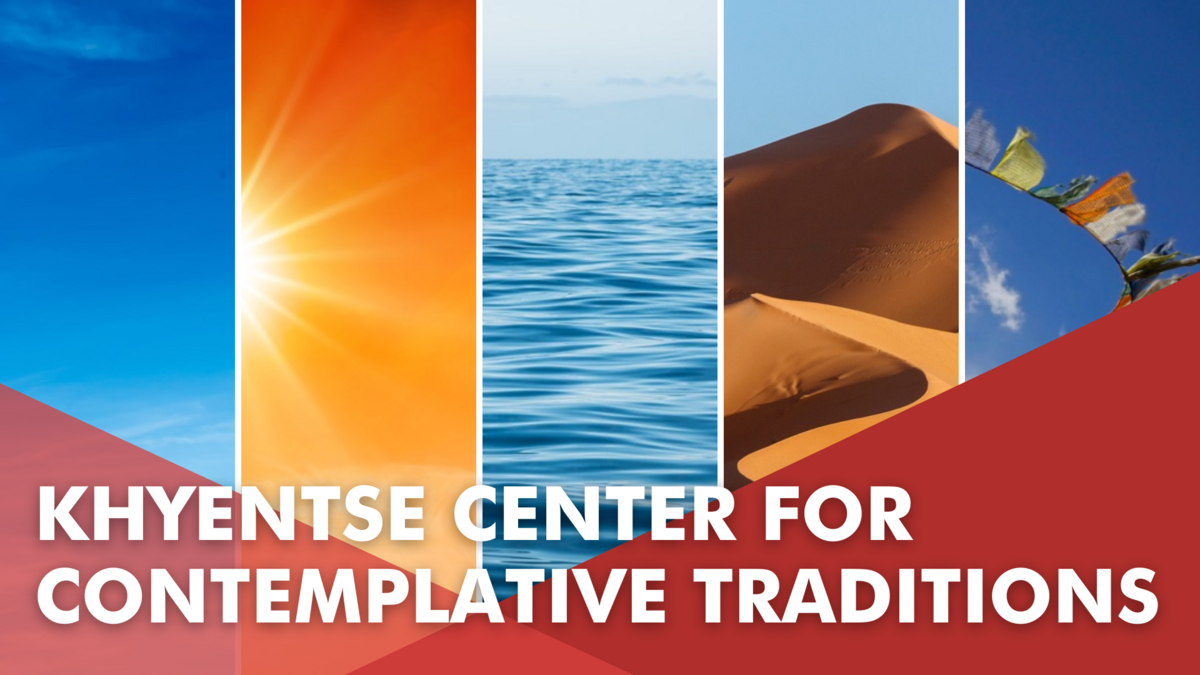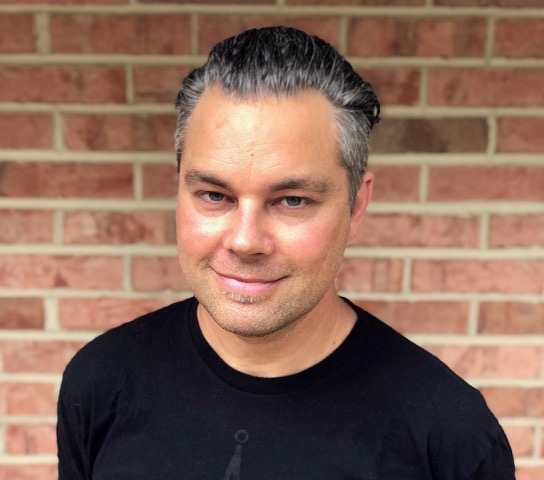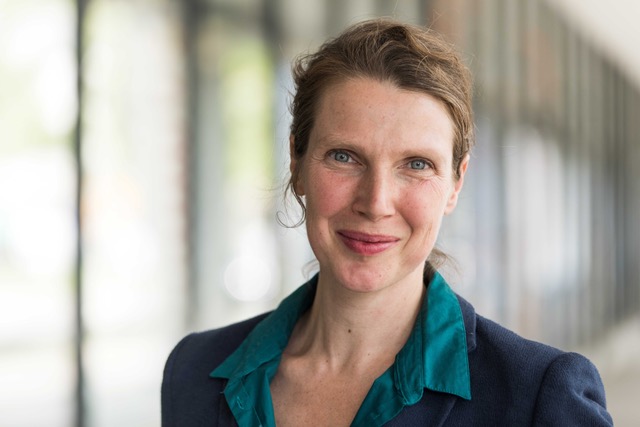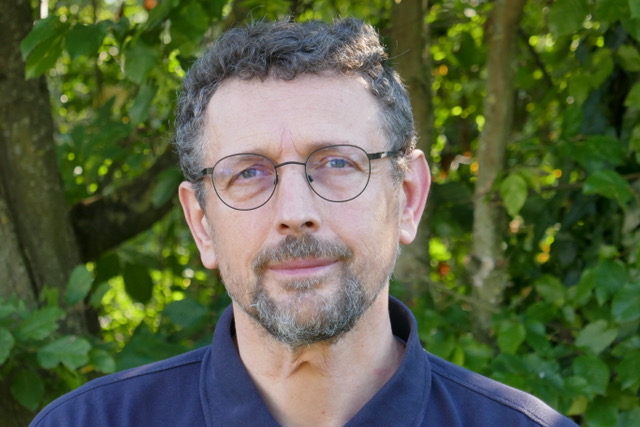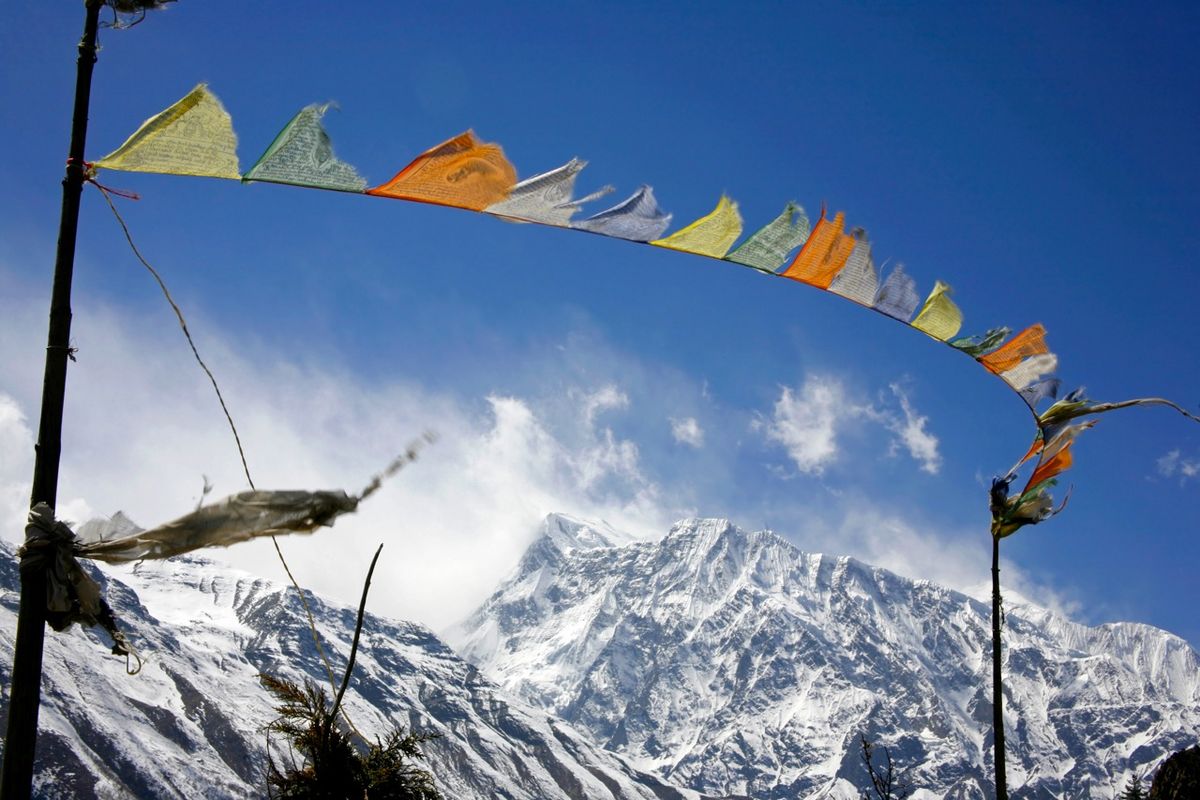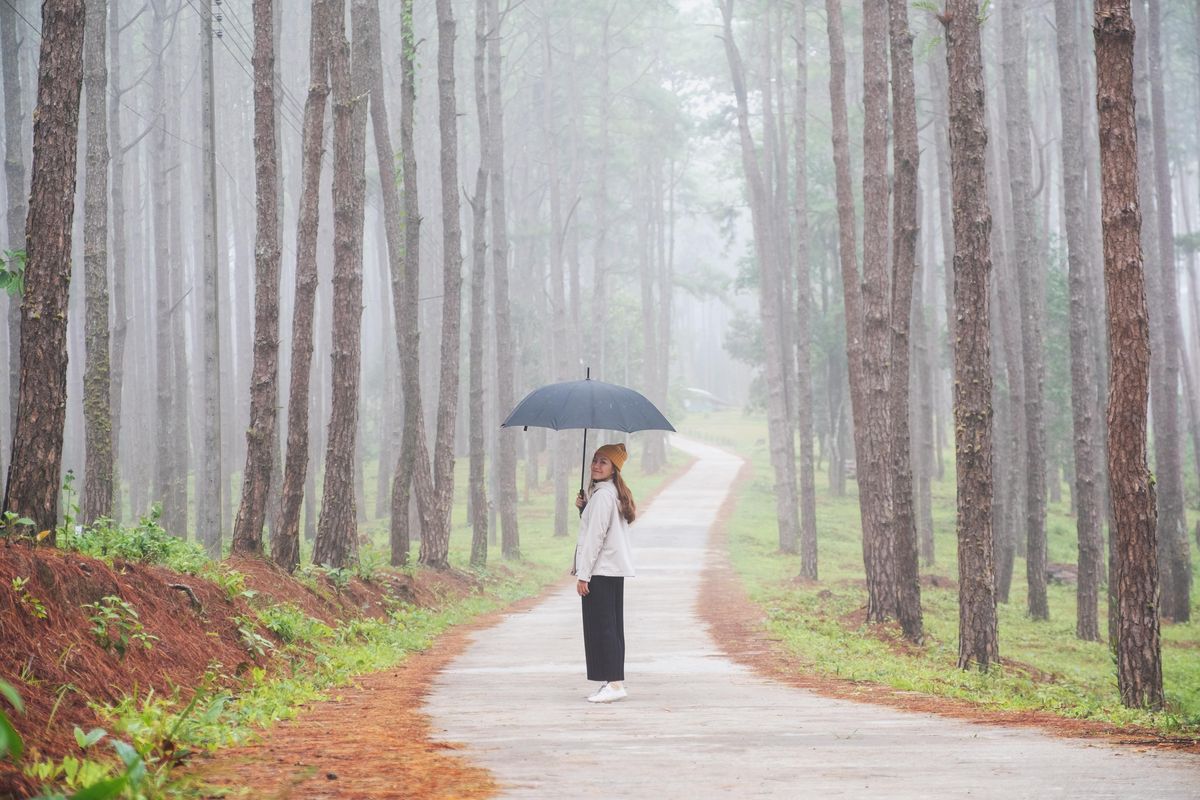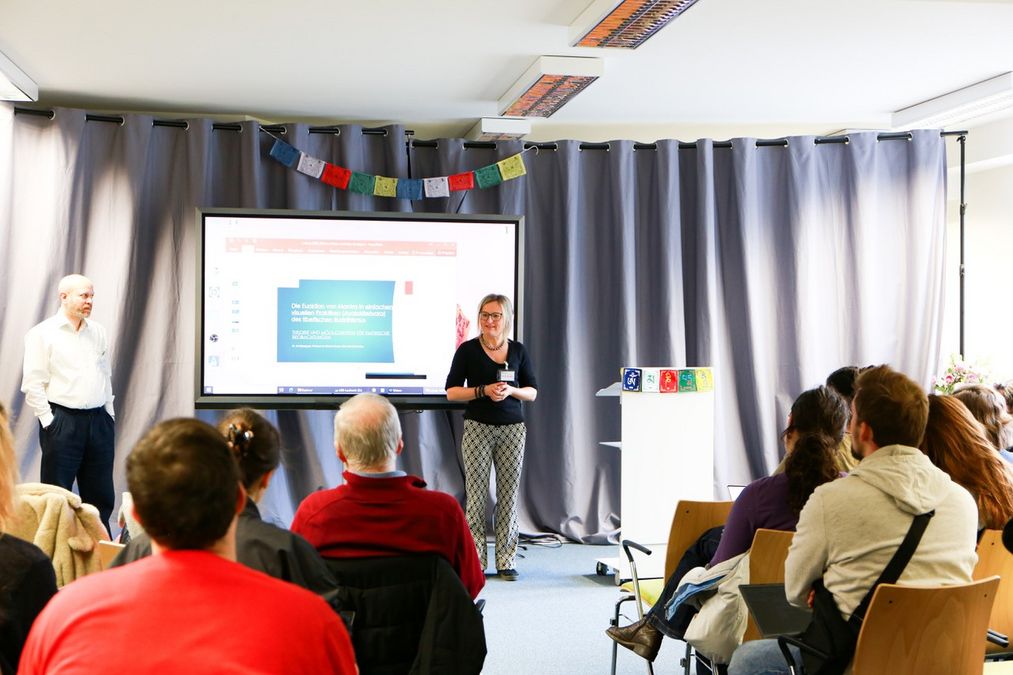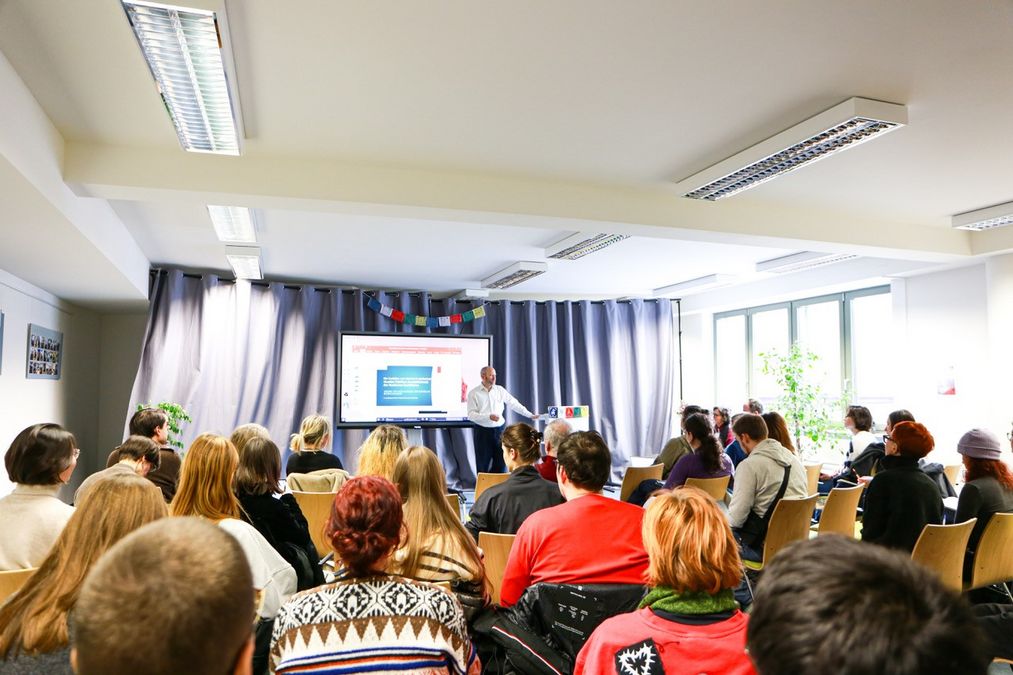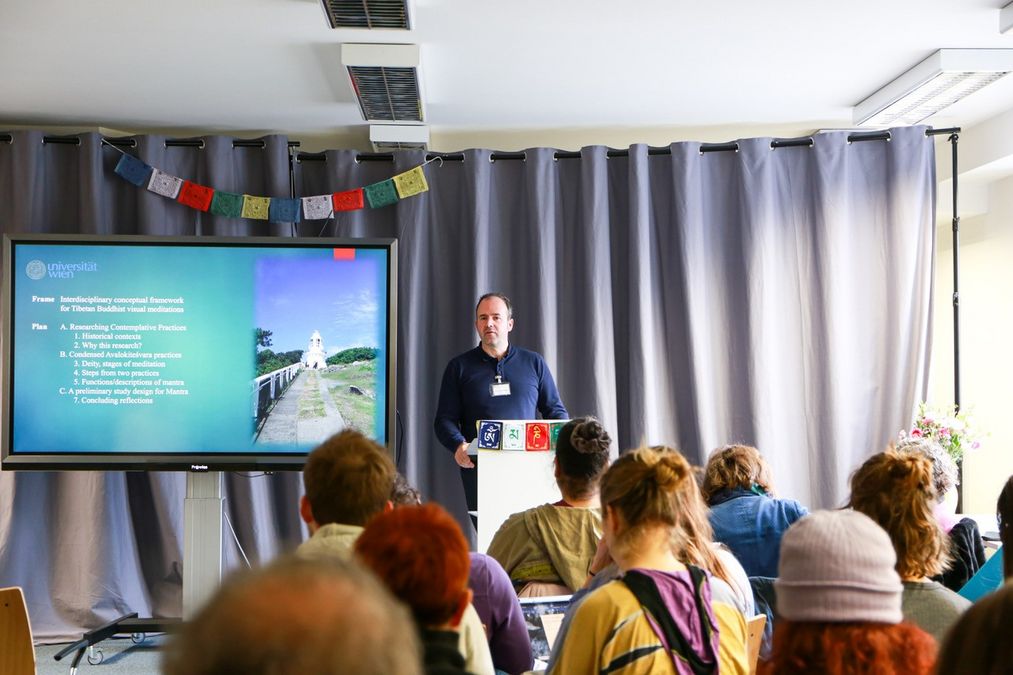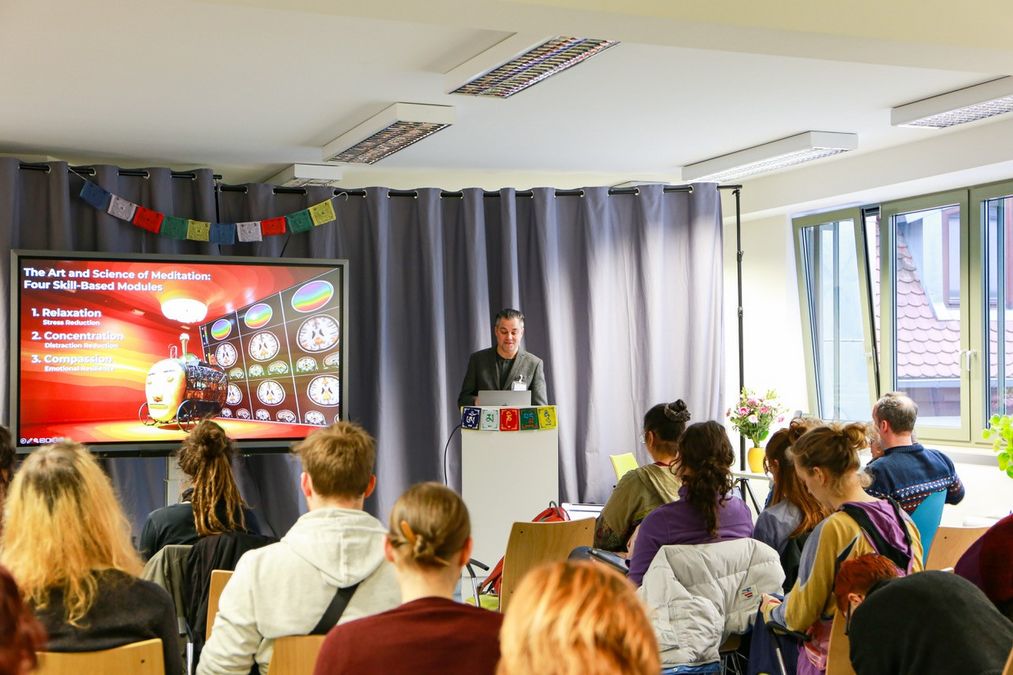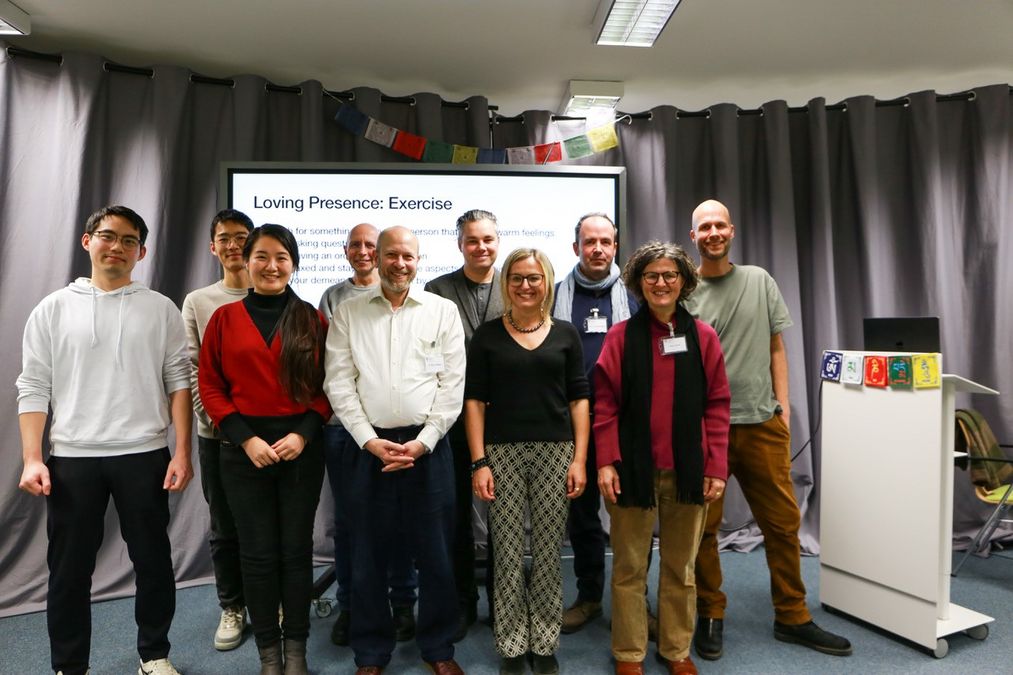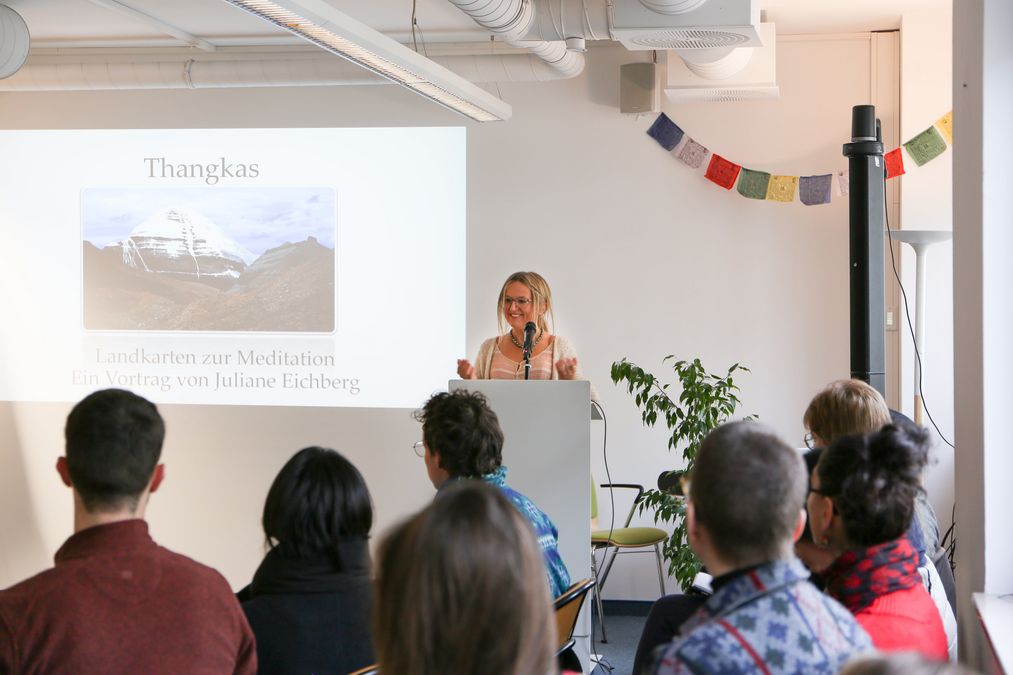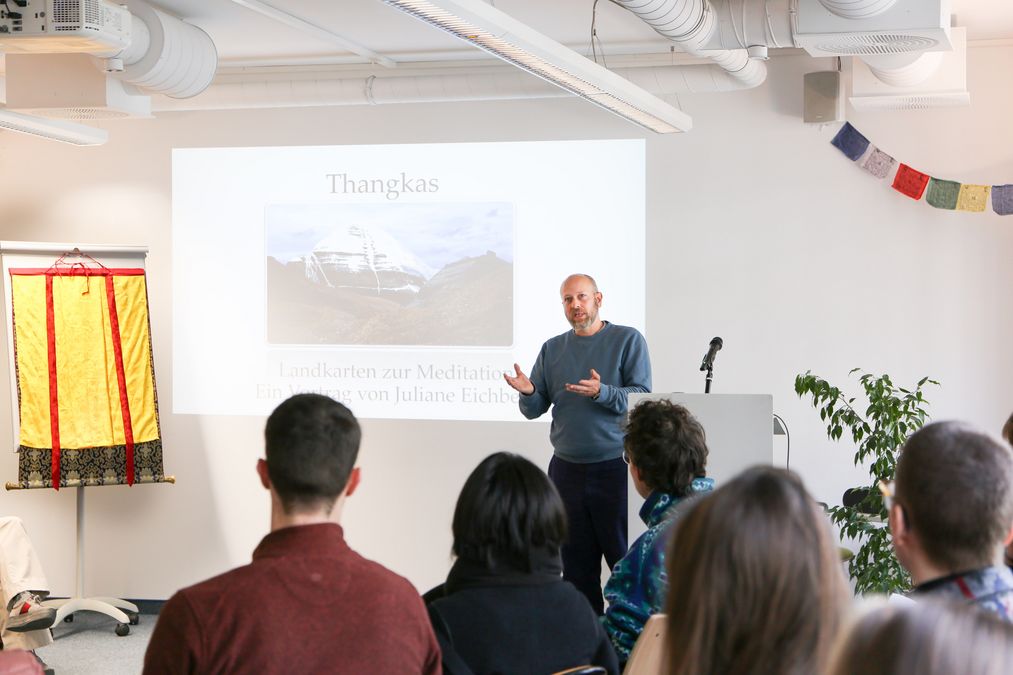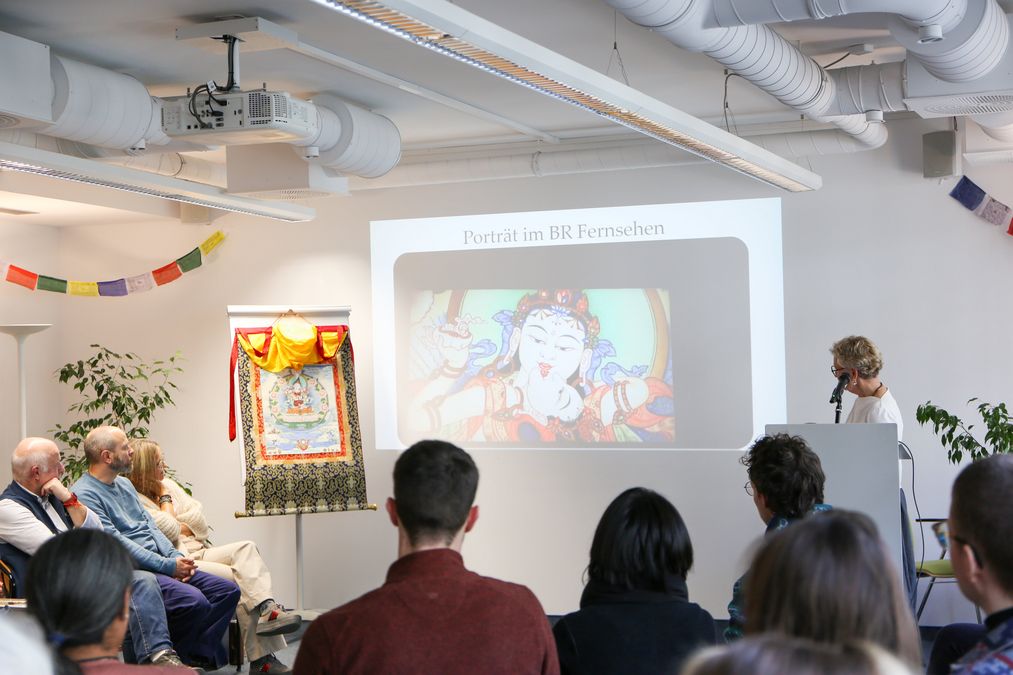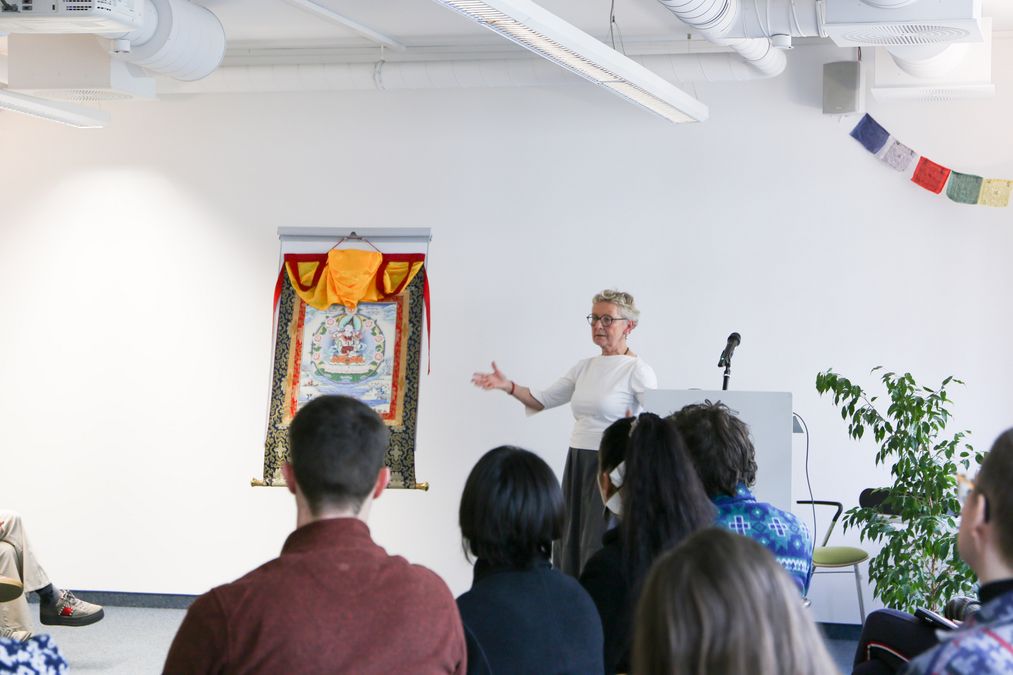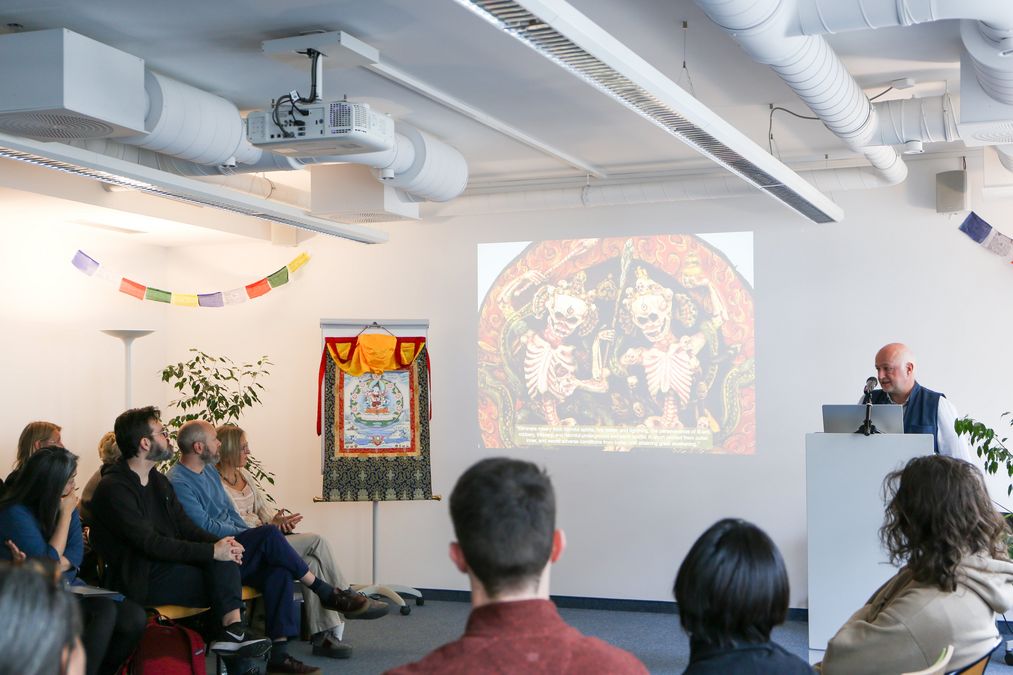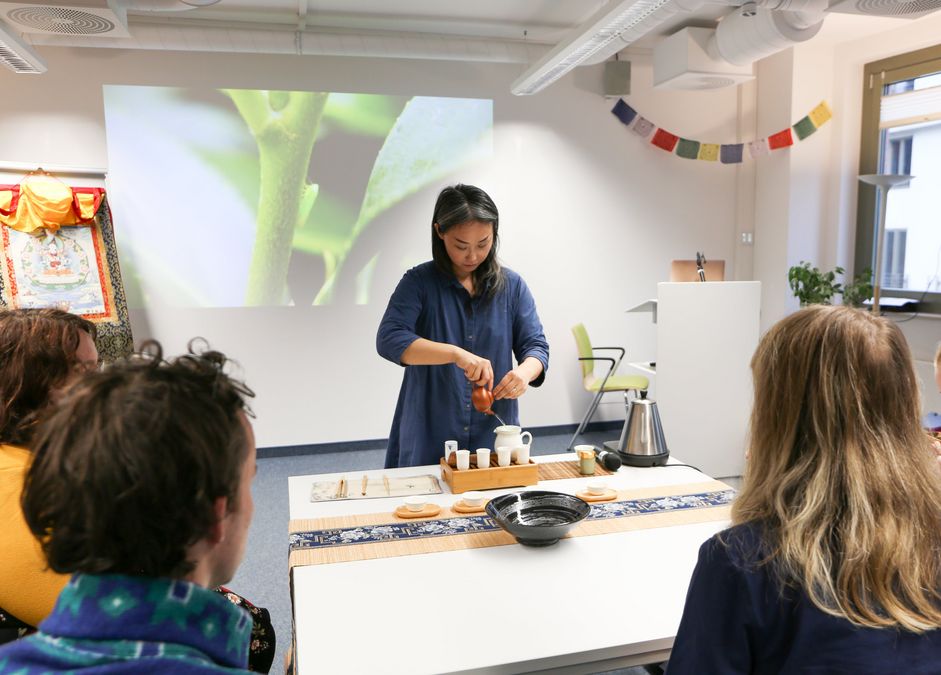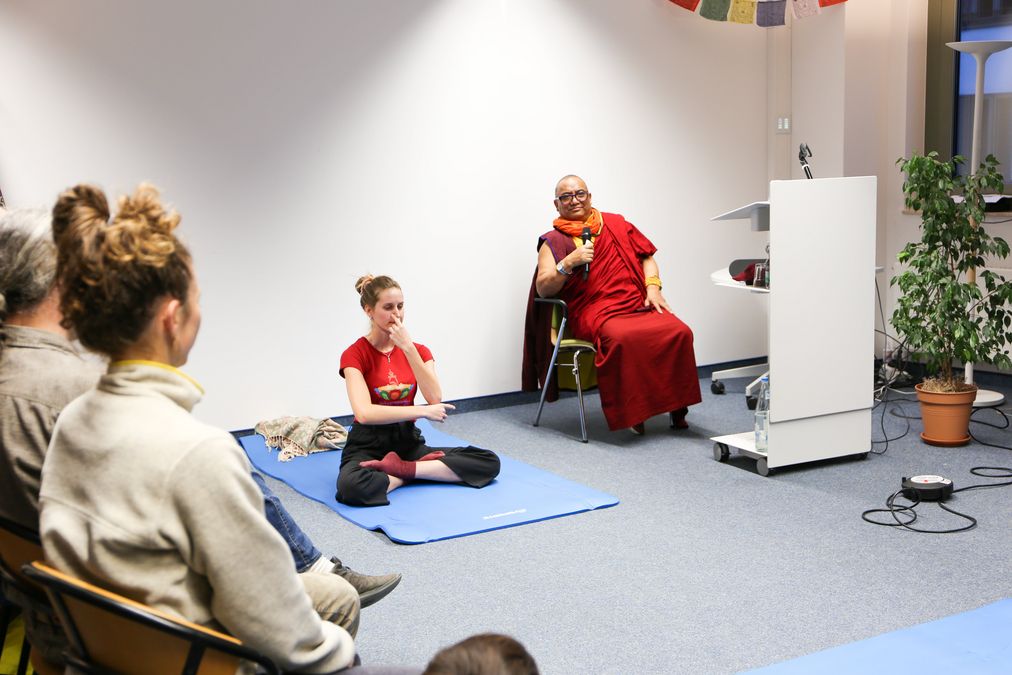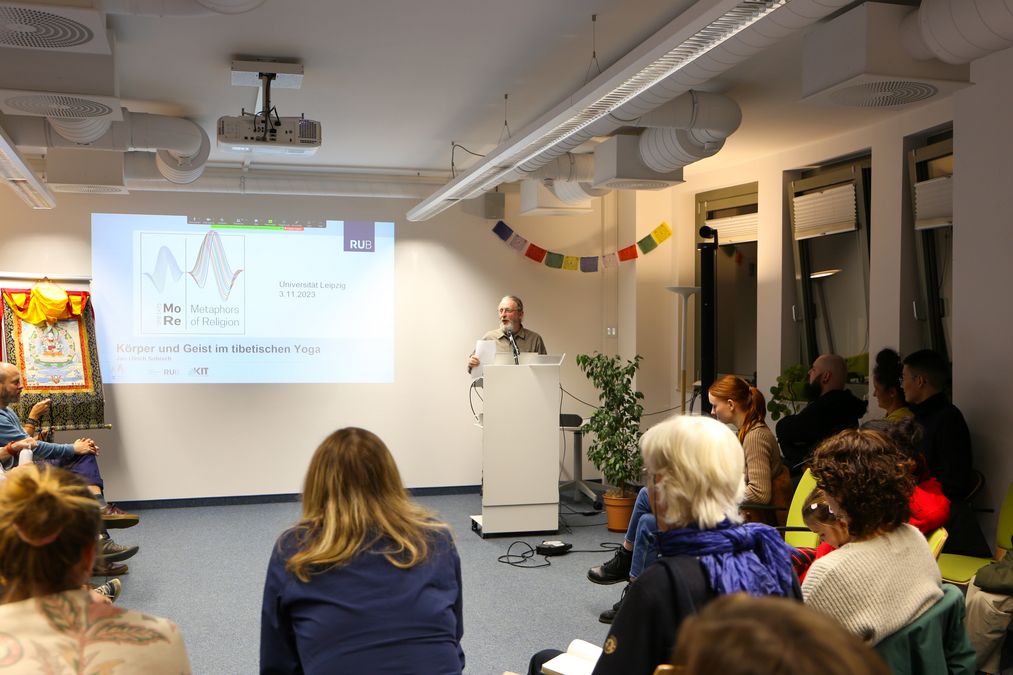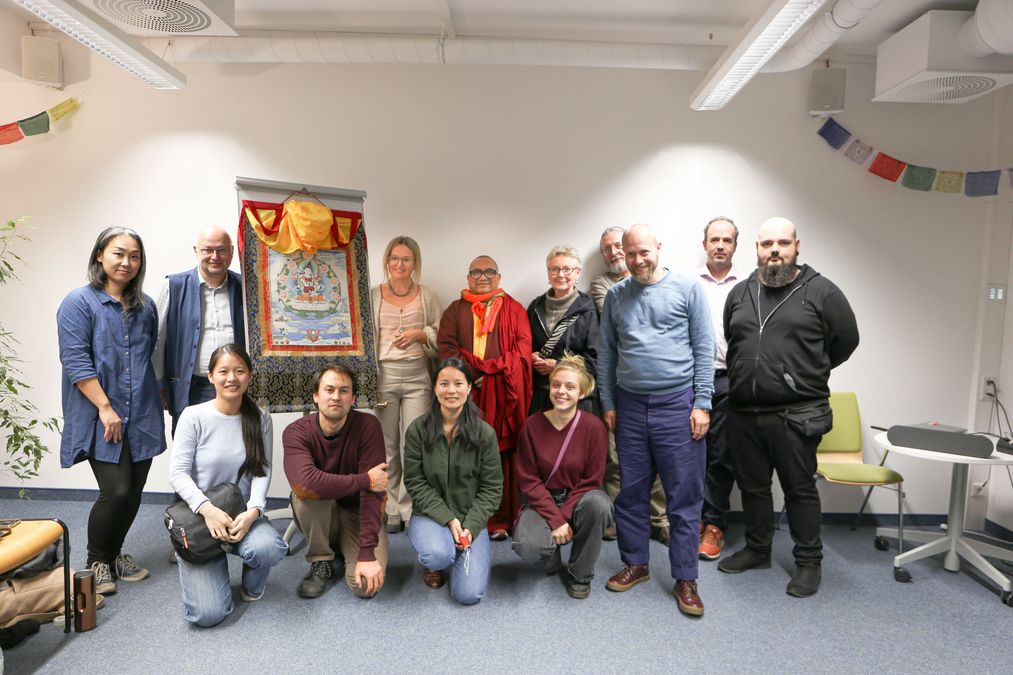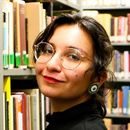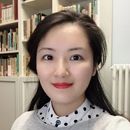In recent years, mindfulness practices have had a significant impact on various areas of human wellbeing like stress reduction, resilience building, and enhancement of emotional and social skills. The origins of these practices are mostly rooted in the contemplative traditions of Buddhism. Our project aims to investigate these mutual transfer processes between traditions and cultures. This involves drawing not only on textual sources from ancient traditions, but also on subjective, transformative accounts of practitioners' experiences.
News
For more information on the workshop “Resilience & transformation through contemplative practices?” on 24th January 2025 see below, or visit our Workshop's page.
No Drama Dharma - Podcast Series with Dr. Marco Walther
Delve into the transformative potential of mindfulness and contemplative practices with our series, No Drama Dharma with Marco Walther. These concise and engaging videos feature discussions with leading scholars and practitioners who explore how these practices can serve as powerful tools for navigating the complexities of contemporary life. From the latest research to practical applications, this series is designed to provide insights and strategies for enhancing mental resilience and well-being. Developed by our students, these clips aim to foster a deeper understanding of how contemplative practices can support personal and collective growth in today's fast-paced world.
Bridging Academia and Living Traditions
Introduction
The Khyentse Centre for Contemplative Traditions is dedicated to the study of the rich contemplative traditions of India, Tibet, China, Japan and other countries, seeking in particular to shed new light on the dynamic interface between scholarship and practice. The exploration of these traditions is not limited to textual sources, but also concerns dimensions of subjective experience. We therefore also seek to explore and understand the practical aspects of contemplative traditions.
Mindfulness practices have had a remarkable impact in recent years on developing resilience, reducing stress, as well as building emotional and social skills and other components of human flourishing. This movement has been largely driven by a changing psychology and a refocused corporate culture. We are seeing remarkable developments such as the integration of compassion into corporate cultures.
A closer look at the content quickly reveals its Buddhist origins. In this context, processes of secularization of mindfulness have facilitated its integration into health systems. However, it seems that this process of extracting ideas and techniques from their spiritual roots has been largely limited to a few practices from Theravada, Zen, and Tibetan Buddhism. The question that now arises is whether all potentially transformative ideas and techniques have already been brought to light, or whether there are still untapped sources waiting to enrich these now widely accepted secular approaches and to provide scholars with a more comprehensive understanding of contemplative traditions.
This project embarks on an exciting journey through the textual sources and subjective experience of practitioners to find answers to this question. The focus is on exploring previously unexplored areas of contemplative practices and providing new perspectives on the centuries-old quest for personal transformation.
Our Objectives
Building bridges: We aim to establish connection and collaboration between the academic world and contemplative traditions, both ancient and recent.
Exploring living traditions: Our platform provides researchers with an opportunity to explore how living traditions rely on both ancient and contemporary textual transmissions.
Understanding transformative aspects: We study the outcomes of contemplative traditions, focusing on the transformative aspects that contribute to human growth, such as mindfulness and compassion.
Unveiling healing processes: Through the lens of Buddhist psychology, we shed light on the healing processes that emerge from contemplative practices.
Research Focus Areas
Mindfulness: We delve into the practice of mindfulness and its impact on individual well-being and positive societal development.
Compassion: Understanding the cultivation of compassion and its role in fostering empathy, kindness, and social engagement.
Textual and Oral Transmissions: Exploring the interplay between ancient scriptures and living oral traditions, uncovering the nuances of processes of transmission.
Contemplative Practices: Investigating various contemplative practices and their effects on mental, emotional, and physical well-being.
Healing and Well-being: Examining the therapeutic potential of contemplative practices.
Collaborative Initiatives
Academic Exchange: The Centre aims to serve as a vibrant platform that engages scholars, students and the wider community in exploring the rich contemplative traditions of India, Tibet, China and beyond.
Conferences and Workshops: Organizing academic conferences and workshops to promote dialogue and share knowledge across disciplines.
Publications: Publishing research papers, books, and journals to disseminate findings and promote further exploration of contemplative traditions.
Join Us!
We invite scholars, students, practitioners, and anyone interested in contemplative traditions to join our community. Together, we can deepen our understanding of these traditions, explore their transformative potential, and contribute to the well-being of individuals and society. Visit our website, follow us on social media, and become a part of the Khyentse Center for Contemplative Traditions.
Thank you for your attention!
Impressions of the Workshop "Resilience and Transformation Through Contemplative Practices"
24 January 2025 | Strohsackpassage, Leipzig
The workshop was dedicated to examining psychological processes in Buddhist texts and their application in modern psychotherapy to promote resilience. The focus was on the connection between traditional Buddhist concepts and contemporary therapeutic approaches, particularly in relation to mindfulness, compassion, and presence.
Prof. Dr. Jim Rheingans from the University of Vienna opened the lecture series with his contribution "The Function of Mantra in Simple Visual Practices of Tibetan Buddhism." In his presentation, he first illuminated the historical context of mantra practice and analyzed in detail the meditation sequences based on two Avalokiteshvara Sadhanas by Tibetan authors which are currently used by practitioners of the Kagyü school. He placed special emphasis on the various functions and descriptions of mantras. In conclusion, he presented a preliminary study design for the scientific investigation of mantras.
Psychological psychotherapist and trauma therapist Dipl.-Psych. Sonja Kramer, who herself has many years of experience in Buddhist practice, addressed the topic "Trauma Therapy and Contemplative Practice." In her presentation, she conveyed a fundamental understanding of trauma and highlighted the influence that traumatization can have on the practice of contemplative techniques, as well as the effects that contemplative practices can have in connection with recovery from trauma disorders. In her lecture, she dealt with both potential obstacles and supportive factors in connecting these two areas and presented David Treleaven's relevant approach "Trauma-Sensitive Mindfulness." She also emphasized the high relevance that trauma sensitization has for teachers of contemplative practices. The theoretical part was complemented by practical exercises with the participants.
Prof. Dr. Dan Hirshberg from the University of Boulder, Colorado, presented his insights on "Teaching Resilience while Mitigating Its Risks." He shared his extensive experiences from working with students in stressful situations and presented a competency-based approach that includes, among other things, abstaining from digital devices. Particularly interesting was his discussion of the risks in teaching, such as the potential stirring up of traumatic experiences or the confrontation with questioning the self as taught in the emptiness teachings of the Mahayana. He described a three-stage process of relaxation, concentration, and compassion, and stimulated a critical discussion about the role of meditation in the secular educational context, including the possibility of awarding credits for regular meditation practice.
Pascal Storz, certified Hakomi therapist and lecturer at the Hakomi Institute of Europe, concluded the event with his presentation "Embodied Mindfulness: The Practice of Loving Presence in Somatic Psychotherapy." He introduced participants to the Buddhist-influenced Hakomi therapy, developed by Ron Kurtz in the 1970s. This body-oriented psychotherapy method is based on the principles of mindfulness, non-violence, and body-mind unity. Storz combined theoretical foundations with practical exercises, allowing participants to directly experience mindful self-exploration. In the therapeutic process, clients learn to consciously perceive their bodily sensations, feelings, and thoughts in order to recognize unconscious core beliefs and transform deeply anchored behavioral patterns through gentle experiments and supportive therapeutic presence.
The workshop was led by Dr. Marco Walther and Prof. Dr. Jowita Kramer and offered a novel mix of theoretical insights and practical applications. The event successfully connected traditional Buddhist teachings with modern therapeutic approaches and showed concrete ways to integrate contemplative practices into contemporary treatment concepts. The numerous participants, including students, teachers, and non-university audience members, were able to relate to the content on a non-cognitive level through the practical applications. Thus, the workshop was a complete success.
- 9:30 - 9:45
Welcoming with Dr. Marco Walther and Prof. Dr. Jowita Kramer - 9.45 - 11:00
Die Funktion von Mantra in einfachen visuellen Praktiken des tibetischen Buddhismus: Theorie und Möglichkeiten für empirische Beobachtungen
(Prof. Dr. Jim Rheingans, Universität Wien) - 11:15 - 13:15
Traumatherapie und kontemplative Praxis: Widerspruch oder wechselseitige Bereicherung?
(Dipl.-Psych. Sonja Kramer, Psychologische Psychotherapeutin, Traumatherapeutin) - 14:30 - 15:45
Teaching Resilience while Mitigating Its Risks: Contemplative Pedagogy in Higher Education
(Prof. Dr. Dan Hirshberg, University of Boulder, Colorado) - 16:00 - 18:00
Embodied Mindfulness: The Practice of Loving Presence in Somatic Psychotherapy
(Pascal Storz, Zertifizierter Hakomi-Therapeut, Lehrbeauftragter des Hakomi Institute of Europe) - 18:30
Closing and dinner with the Speakers
Impressions of the opening workshop "Exploring the Intersection of Scholarship and Practice in Indology and Tibetology"
date: 03.11.2023, 10:00 a.m. – 06:30 p.m.| venue: Strohsackpassage 3rd floor (room 3.25)
... in Pictures
... in Words
On Friday, 3rd November 2023, the opening of the Khyentse Center for Contemplative Traditions at Leipzig University's ReCentGlobe was celebrated after extensive preparation. The celebration commenced with an all-day workshop on the convergence of scholarship and applied contemplation. It was an eventful day with attendees outnumbering the available seats; a testament to the enthusiastic response.
In the first lecture of the day, Juliane Eichberg (Garmisch-Partenkirchen), a painter of Tibetan scroll paintings (Tib. thangka), introduced us to these special works of art as “maps for meditation.” From her perspective as a Western thangka painter, she gave us insights into her training with masters of traditional painting, her life journey and how she exercises painting as a contemplative practice. To show different stages of her work, she exhibited a scroll painting of Vajrasattva that she had made. To show how these paintings are proportioned she explained the use of some of the traditional units of measurement, such as the span of a hand, and how these are applied to the geometrically strict line drawings that guarantee the paintings’ standardization in measure. The discussion that followed focused on issues such as artistic freedom and individual expression and how these can be in harmony with or in contrast to a traditional view of painting as a craft.
In the following lecture by Dr. Christian Luczanits (SOAS, University of London), the scroll paintings were viewed from an art-historical perspective. A special aspect of Tibetan Buddhism is that one's own teacher is seen as the perfect Buddha. Rare images of the masters Phagmodrupa and Taklung Tashi Pel were used to illustrate the visual development of the equality of the lama with the Buddha. Here it became clear how the visualization of ideas in Tantric Buddhism underwent a transfer from India to Tibet, very similar to the transfer from the Tibetan tradition to a Western context, as we saw in the presentation by Juliane Eichberg earlier.
Dr. Jin Kyoung Choi (Bavarian Academy of Sciences, LMU Munich), Buddhologist and owner of the Laifufu Teasalon in Munich, presented "The Art of Brewing a Cup of Mindfulness: The History of the Gonfu Tea Ceremony in East Asia and Beyond" and demonstrated a secularized tea ceremony. Her lecture provided deep insights into the history of the cultivation and processing of the tea plant, as well as the development of tea consumption, which was used early on by Buddhist monks to support their meditations.
Lama Drupon Kunsang (Drikung Kagyu Dorje Ling, Kreuzlingen, Switzerland) gave enlightening explanations on the background of the Tsa Lung practice in relation to the general topic of his presentation, “Tibetan Yoga”. The ‘secret’ yogic exercises (Trülkor) as well as the physical exercises (Lüdjong) to promote general health were discussed. His explanations were brought to life by his student Sahra Schwendimann, who showed us a series of breathing exercises and movement sequences that go back to the 13th century Tibetan master Gampopa.
The final lecture was given by Dr. Jan-Ulrich Sobisch (Center for Religious Studies, Ruhr University Bochum) on "Body and Mind in Tibetan Yoga". Theoretical approaches to the attainment of awakening, emphasizing either the medium of the mind or that of the body, were presented on the basis of some essential Indo-Tibetan texts. The explanations of the subtle energy pathways of the body could be directly related to the physical exercises shown earlier.
In an informal setting, lively discussions and inspiring exchanges took place between representatives of Buddhist studies, students from different disciplines and participants from the general public. This first workshop was a fruitful foundation and promises more exciting events building bridges between scholarship and contemplative practice, doctrine and application, history and the present.
- Every single contribution was rich in content, very interesting, and showed me once again the depth of Buddhist philosophy, culture, and way of life. I particularly liked the illustration of the Tsa Lung exercises and the abundance and diversity of the traditions. The lectures on art history and cultural history were very exciting. It was a pleasure to be able to listen to so many specialists and I would be delighted if there were events of this kind again.
—Thora P.
- The workshop "Buddhism in Theory and Practice" of the newly opened Khyentse Center for Contemplative Traditions offered interesting insights into the academic study of Buddhist content as well as into the world of experience of practitioners. I particularly welcome the open-minded communication between academics and practitioners, which in my view promotes a necessary mutual understanding and is enriching for both sides. I am therefore looking forward to further projects and events at the Khyentse Center that can contribute to this exchange.
—Michelle K.
- Thangkas, yoga, and a tea ceremony – the exciting lectures including vivid demonstrations gave us a deeper insight into the various aspects of Buddhism and its cultural diversity. It was really a valuable experience for me, and I now see the opportunities to explore Buddhism in practice, as well as to connect practice with theory in my research.
—Zhoulin L.
„Thangkas - Landkarten zur Meditation: Aus der Praxis einer (westlichen) Thangka-Malerin“
Juliane Eichberg
Das Thangka-Malen fällt unter den buddhistischen Wissenszweig „Kunst und Kunsthandwerk“ und gehört mit Philosophie, Logik, Sanskritgrammatik, Medizin und Astrologie zum Wissenskorpus der Tibetischen Kultur.
Zur Referentin: Ursprünglich von Beruf Kartografin malt Juliane Eichberg seit 1992 Thangkas, sogenannte Landkarten zur Meditation. Reisen nach Tibet, ein halbjährlicher Aufenthalt in Kathmandu, fortlaufendes Studium des Buddhismus, bedeutsame Kontakte mit tibetischen Meistern und vieles mehr bestärken ihre Ambitionen bis heute. Sie hält Workshops, gibt im Einzel- oder Gruppenunterricht Grundkenntnisse und Techniken in traditioneller Weise weiter.
______________________________________________________________________________
Der Tibetische Lehrer als Buddha
Dr. Christian Luczanits
Ein häufig auf tibetischen Rollbildern (thangka) dargestelltes Motiv ist der tibetische Lehrer. Diese Portraits reflektieren nicht nur die Prominenz des Lehrers im tantrischen Buddhism allgemein, ohne ihn kann diese Form des Buddhismus nicht praktiziert werden, sondern nehmen in Tibet auch eine sehr spezifische Form an, die sich am Buddhabild orientiert. Frühe tibetische Portraits belegen also eine neue Konzeption des tantrisch-buddhistischen Lehrers in Tibet, die für den tibetischen Buddhismus charakteristisch bleiben sollte.
Zum Referenten: Dr. Christian Luczanits ist Dozent für tibetische und buddhistische Kunst an der Abteilung für Kunstgeschichte und Archäologie der SOAS in London.
______________________________________________________________________________
Die Kunst, eine Tasse der Achtsamkeit zu brauen: Die Geschichte der Gonfu-Teezeremonie in Ostasien und darüber hinaus
Dr. Jinkyoung Choi
Die historische Entwicklung der Teekultur, wie sie in Ostasien praktiziert wird, ist immer noch exotisch und für die Mehrheit der Weltbevölkerung ein relativ unbekanntes Kulturgut. In diesem Vortrag werden die Geschichte und die Entwicklung einer der beliebtesten Teekulturen, der "Gongfu-Teezeremonie", in ganz Ostasien vorgestellt, erläutert und im Zusammenhang mit verschiedenen religiösen und sozio-politischen Faktoren wie dem Buddhismus, dem Kolonialismus und dem Kommunismus dargestellt.
Zur Referentin: Dr. Jinkyoung Choi ist Expertin in den buddhistischen Traditionen Indiens, Tibets und Chinas. Ihre Leidenschaft gilt aber auch dem Kulturgetränk Tee! Seit 2019 ist sie Inhaberin des Laifufu Teesalons in München, wo sie sich aktiv in der Teeerziehung und Teezeremonie für die Öffentlichkeit engagiert. Diese Tätigkeit hat ihre akademischen Interessen erweitert und sie dazu gebracht, die Schnittmenge von Teekultur und Buddhismus in ganz Asien zu erforschen.
______________________________________________________________________________
Tsa Lung – Tibetisches Yoga
Lama Drupon Kunsang
Chakren, Meridiane, und Atemübungen – all dies und noch mehr fasst der tibetische Begriff Tsa Lung zusammen. Yogapraxis beinhaltet Techniken, die auf einem subtilen Verständnis des Körpers, des Atems und des Geistes beruhen. In diesem Vortrag erhalten wir Einsichten in diese tiefgründige Welt der inneren Prinzipien aus der Tradition des Tibetischen Buddhismus.
Zum Referenten: Lama Drupon Kunsang, ist ein anerkannter Meditationsmeister und Leiter eines buddhistischen Zentrums am Bodensee in der Schweiz.
______________________________________________________________________________
Körper und Geist im Tibetischen Yoga
Dr. Jan-Ulrich Sobisch
Man kann in den tantrischen Texten des Buddhismus sowohl eine Fokussierung auf den Körper als auch auf den Geist als Buddha finden. Dementsprechend haben sich verschieden tantrische Methoden herausgebildet, die entweder mehr mit dem Körper oder mehr mit dem Geist arbeiten. In dem Vortrag geht es um die Frage wir sich die hauptsächlich auf den Geist gerichtete Mahamudra-Lehre und die hauptsächlich auf den Körper gerichteten Yoga-Praktiken zueinander verhalten.
Zum Referenten: Dr. Jan-Ulrich Sobisch hat in Hamburg Tibetologie, Alt-Indologie und Philosophie studiert und in den letzen 30 Jahren in Hamburg, Kopenhagen, München und Bochum geforscht und gelehrt. Sein Hauptinteresse ist die Erforschung verschiedener tantrischer Traditionen im Tibet des 11.-14. Jahhunderts.
